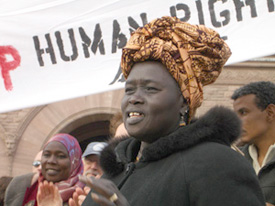Sudan, Canada, and the struggle for self-determination
 “Respect the outcome of the referendum, embrace peace and resist any call to return to war.”
“Respect the outcome of the referendum, embrace peace and resist any call to return to war.”
Women’s groups of Sudan, Khartoum, December 2010.
6 years is a long time to wait. But after six years of interim peace, the people of Southern Sudan are finally choosing their future in a referendum on self-determination. Beginning January 9th 2011, Southern Sudanese will begin voting on whether to remain part of a united Sudan or to form a new country of their own. I have been invited to observe the referendum process.
Self-determination is a right, of course, guaranteed in international law. “All peoples have the right of self-determination,” according to both major international human rights covenants, the ICCPR and ICESCR. The United Nations Charter places the right of self-determination at the heart of international law and diplomacy. It’s a right guaranteed to the people of Southern Sudan, as it is to the people of the Palestinian territories, the people of Aceh, Indigenous peoples of Canada, and other national peoples.
International law gives considerable latitude in the process used for gauging a peoples’ will (Sudan, both North and South, have chosen a formal referendum) as it remains silent on a preferred outcome. Whether a people freely chooses independence, federation, some other form of autonomy or even full assimilation, the essential principle of the right to self-determination is that a people, or a nation, chooses for itself.
When I began working for KAIROS just over six years ago, the peace process in Sudan was in full flight and a peace agreement was about to be signed. The Comprehensive Peace Agreement guaranteeing the people of Southern Sudan the right to a referendum on self-determination was signed by the warring parties in January 2005. At the same moment, however, the conflict in Darfur was heating up; today, there is still no peace in the western part of Sudan in sight. Hundreds of thousands of Sudanese have died needlessly in that ongoing conflict, and millions more have been displaced. Reports are that the people of Darfur are closely watching the process in Southern Sudan.
Self-determination is understandably an absorbing issue for Canadians. The people of Québec (recognized as a “nation” by the government of Canada) have gone to the polls twice since 1980 to decide whether or not to remain citizens of Canada. On both occasions, Quebecers decided to remain within Canada. In 1948, the people of Newfoundland and Labrador decided in a referendum to join a confederation with the rest of Canada.
In my time at KAIROS, Sudan has been a principle concern of our members. I have travelled twice to the country to meet with partners in the Sudan Council of Churches among others, and to offer what assistance the Canadian churches are able. But I travel this time to Sudan with the extra interest of someone directly affected by struggles of self-determination in his own country.
My family left Québec as a result of the national struggle for independence. My father’s office – like so many others – was transferred down the highway to Toronto. But I speak French because of that same national struggle. French-language teaching was introduced into English schools in Québec because of the Quiet Revolution, and for that I’m grateful.
If there is one thing I hope for in Sudan, it’s another thing we also experienced in Québec, what the women of Sudan hope and pray for, as well. Even during the worst tensions between communities in Québec, the revolution remained mostly peaceful. I hope that, regardless of the outcome, Sudan finally finds peace.
——————————————-
John Lewis, KAIROS International Human Rights Coordinator, accredited by the South Sudan Referendum Commission, is currently in South Sudan on behalf of the Canadian churches monitoring the self-determination referendum called for in the 2005 Comprehensive Peace Agreement ending 20 years of North-South civil war.








